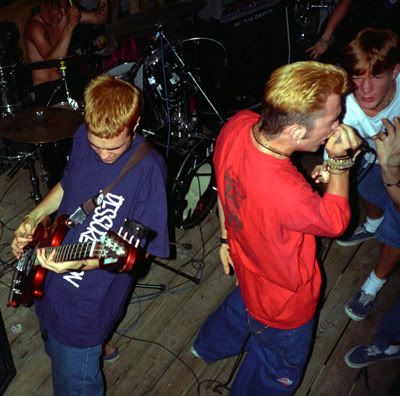
Demian and John with Undertow, Photo courtesy of: Tom Holcomb
So now [February, 1996] you're living in Manhattan or Brooklyn?
Manhattan.
Shift already has an EP and an LP out on Equal Vision. By the time you join the band, are they now on Columbia Records?
No. I knew that was gonna happen. I wasn't sure what label it was going to be, but knew that there was major label interest when I moved out. I'm not sure I would have moved out without that, because Manhattan's so expensive. So I moved out, and we were at the beginning phases of meeting with labels.
Do you think there was some sort of DIY underground hardcore ethic that you adopted with Undertow that you had to abandon with Shift? Or did your experience with Shift not conflict with any of your ethics?
Good question. I knew what was going on and what was at stake. I wanted a major label. That sounded fucking great to be able to play music for a living. And I don't think that there were any ethical things that I had issues with. It was just sort of a surreal experience where Undertow never had management or any of this stuff, and when you're having those meetings . . . you're going in a room, people are feeding you and they're taking you out to dinner and all this stuff. You're really being treated well, and they're telling you how great you are. This is surreal. This is what I thought a sitcom about signing to a major label would be. Everyone tells you how fucking great you're gonna be. My background was different than Shift's. I think Shift knew what they wanted to be. They wanted to be not necessarily rock stars, but I don't think with Undertow, none of us ever really gave a shit. We want to play music, we like playing music with each other, we liked being a part of a scene. There were big differences for me personally. You're used to sleeping on floors, when now you're like, "Well we can afford hotel rooms." It was a completely different world, but one that I came into with open arms, because it was exciting. I never knew what I wanted to do for a living, so the idea of being in a band and getting paid for it was pretty impressive.
How did you end up on Columbia?
They just seemed to offer the best deal and the best scenario. We didn't have management at the time, but we had a great lawyer, and he laid it out for us that 90% of bands that get signed don't make it, and not [that we] should get the most money, but it is kind of what that's all about. Our A&R person was like, "I'm hands off. I'm business, I'm here for the label, but you guys can kind of do whatever you want to do." So it seemed like a good environment where they kind of gave us free reign to do whatever we want to do . . . and maybe pushed us in certain directions. I think I was 21 when I moved out there and I was the oldest member of the band. It's a lot of young kids looking forward to what they can do with this opportunity. My experience back then, this was '96, '97, was a lot of business people from a business background telling you how to make money at playing music. Looking back at it, we were all so young. Some of that influenced us, some of it didn't, but it's very surreal having an adult tell you [that] you can make millions at the age of 21 if you follow these patterns. And I don't think it was ALL those things. I think there was us wanting it. If you write a great song, you could have a career and not ever have to fucking work again, and live this lifestyle you're living.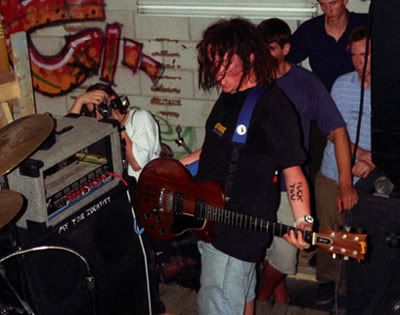
Mark with Undertow, Photo courtesy of: Tom Holcomb
You told me a long time ago there was a meeting with Columbia, and Tommy Mottola stuck his head in the meeting, and he was the president of Columbia at the time, or [Columbia's parent company] Sony.
We should probably skip that.
Okay . . .
It's a good story. Okay, ask the question, I'm going to give you a real . . .
He messed your name up. He called you guys something other than Shift.
No no, he knew the name, but he missed one of the names of the songs.
He called [the song] “Spacesuit” "Spaceboy."
Yeah.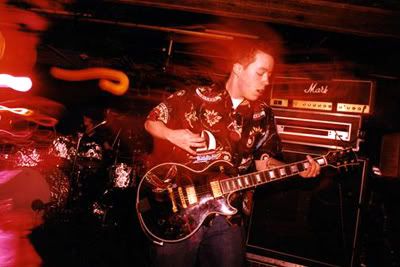
Mark with Shift at Lost Horizon, Syracuse, NY 1997, Photo: John McKaig
Whatever!
I think that goes to show how the music industry CAN be. People have had success, and I think Shift came into it at the time when there was a lot of rebellion. "We don't want corporate to be involved in the hardcore scene." And Shift was part of the hardcore scene. Maybe not a hardcore band, but they were part of the scene. Us with Orange 9[mm], CIV, and Quicksand . . .
Sick Of It All . . .
Yeah. This is what I remember. There was kind of a turning event where we were getting called sellouts, and you shouldn't sell out your scene and all this shit, but I think as 21 year olds we saw it as an opportunity to have a career. And then you go to the opposite end with people telling you, "Texas Is The Reason might get signed,” and “All these bands are getting signed and it's corrupting the scene," to go to the opposite end when you meet people that they are SO fucking business that they mess up your name or they mess up the song at the moment when they're REALLY not supposed to. And you're meeting these people that are like married to Mariah Carey. You're treated with such opulence. You go from this world of being DIY to it being business, and my experience is that overnight you're being taken out to dinner and all this shit. It was overwhelming. I think that the right intentions were there, but we had experiences that were very surreal and I can't believe the bullshit that people were telling us.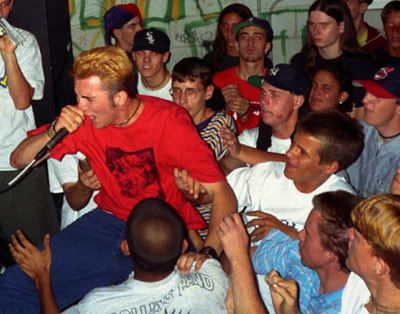
John hits the crowd, Photo courtesy of: Tom Holcomb
Who was your lawyer?
This guy Richard Grabel who did Quicksand, Shudder To Think, Sick Of It All, everybody in New York. He was probably the best. As far as management, A&R, or anybody at the label, he was taking care of us more than anybody. He was really good about his job, and really sincere. Everybody hates lawyers, but he was the best person in that he looked out for Shift better than anybody I think.
So Shift recorded one album for Columbia [1997’s get in] - the only thing that you play on. And you wrote how much of that album?
One riff.
One riff in one song?
Correct. Me and Josh were writing completely different stuff. I was really into Drive Like Jehu and Chavez, and I joined a band that already existed and already was successful before that, and Josh said, "If riffs apply, they'll get in," and most of my riffs didn't, because I was on a different page. But I wrote one riff for that record. And I didn't think I did it on purpose. I didn't introduce it. I think Josh actually heard it and was like, "That actually works real well as a bridge for this song." [The song is titled “In Honor of Myself” – Ben] He was trying to incorporate me in. I was really into Bluetip, Chavez, and Jehu at that time.
Why do you think the last Shift album wasn't successful?
Um . . . I don't know.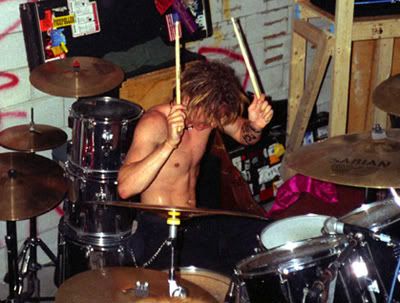
Ryan bangs it home with Undertow, Photo courtesy of: Tom Holcomb
You think you weren't handled appropriately by the label?
I don't think anybody's to blame. There was an idea of what we COULD do and maybe that wasn't achieved, but I don't blame the label. I don't think our management was terribly supportive, but there was a transition there where I think we were trying to write a record, I don't want to say for mass appeal, but we saw an opportunity for what it could be, and we wrote accordingly I guess. I don't think there's anybody to blame, but in my mind there is a difference between [the debut Shift LP] spacesuit and get in.
The difference being what? That get in is more accessible?
Yeah. We were young and we saw an opportunity and I think a lot of people in the band wanted . . . this is what they were moving towards. And maybe I'm naive but I've always been the guy that I just want to write a hot riff that impresses. People hear that riff and they're stoked on it. I've never had a perception of . . . money or fame or wealth has never been anything that I've been concerned with. Maybe there were people in the band that saw that, maybe there were people in the band that didn't give a shit. I mean at 21, looking back at that now, I'm almost 36, it's hard to say. You're tossed with the opportunity to make millions of dollars. People hadn't done this before us. There was Quicksand and Texas Is The Reason, this was all up and coming, but it was just a time when it was very confusing. I think Josh is the person you need to ask more about what was going on. He wrote music and it was his band. He would be the guy to ask about some of that.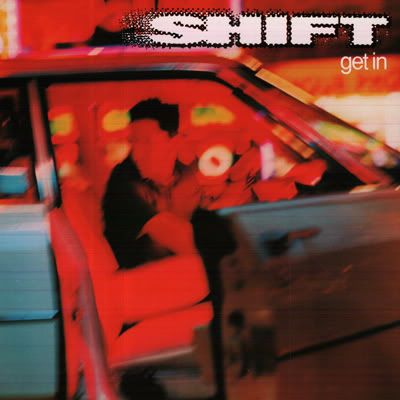
Did you make money playing music with Shift?
Yeah.
How so?
I don't want to get into specifics . . . but what can be done is you get signed for a certain amount of money. Your lawyer takes 10% off the top. Your management if you have it at the time takes 10 to 15[%] off the top, and you're left with this chunk sum. Shift got a bit of a budget to buy new guitar equipment and drums with, and we got a signing bonus, which was minimal for living in Manhattan, and the expectation that, let's say it's $5,000, for you to live off that $5,000 for the next two years, which involves recording and touring. So another great route to go is publishing, where you're signing a deal that this publishing company will promote you, but they get half of your money. So they gave us a bunch of money . . .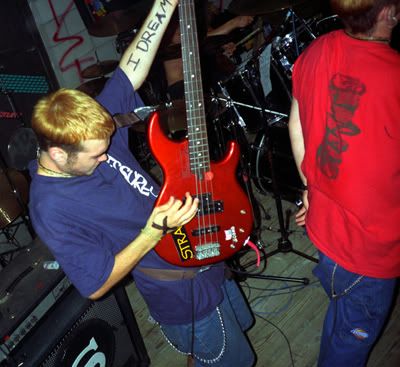
Demian and John with Undertow, Photo courtesy of: Tom Holcomb
An advance.
Yeah. They're giving you an advance, which was a great deal for us. That gave me money to live off of for a long time. Shift being on tour was pretty self-sufficient I think. I was able to pay rent after coming off tour, and I didn't really touch that [publishing advance] money for a long time.
So signing a publishing deal is betting against your own success?
It is. And the examples they gave us were Smashing Pumpkins and Hootie & the Blowfish. [They] were two bands that said, "No, we think we're going to be successful. We don't want anybody else touching our money." So every time you hear a Hootie & the Blowfish song or a Smashing Pumpkins song, 100% of that money is going to Billy Corgan or uhh . . .
Hootie.
(laughter) I know that's not his name. And then the majority of other bands . . . I don't know what it's like now, but the majority of bands back then [would] get this publishing deal that you can live off of . . . so you had money.
Shift in Washington, DC 1998, Photo: Mike Dubin
Well you made the right choice. Obviously. Because if you hadn't have signed the publishing deal, you WOULDN'T have made money from the band.
Yeah, but who knows at that time. It's survival. It wasn't about we're banking against ourselves, although our lawyer told us, "These are your options. This is what it actually breaks down to." It was more about I'm living in Manhattan, I'm paying an obscene amount of rent, and I can't keep a job because we might go on tour in two weeks. If I have to survive being in a band, I’ll totally, totally fucking get that.
When you moved out to New York, you moved with your girlfriend?
Uh huh.
This was your girlfriend from high school?
Correct.
You ended up marrying her?
Yeah. We were together for a total of ten years. I met her when I was 18 and she was about 17. She was around for all of the Undertow stuff. I think after four years we did the math to figure out how much time I was actually around, and I was around for half of that time. Not like we did a lot of touring, but she put up with a lot of shit, and I don't think I could've moved to New York without her, and we were together until . . . 2000 we got married, and 2002 we got separated after ten years. If you want to interview her (laughter) she knows a lot about Undertow and Shift.
What happened with that? It's kind of a personal question, but it's a big part of your life.
No, it's alright. after ten years and starting out so early on I think we just moved in different directions. Me being 18 and her being 17, and me being 28 and her being 27 we were kind of on different pages at that point. I think we loved each other, but maybe weren't IN love anymore. I don't know what the follow up question is, but September 11 happened for me.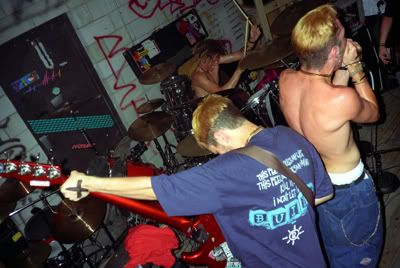
Demian and John with some Seattle Straight Edge, Photo courtesy of: Tom Holcomb
Thursday, September 8, 2011
Mark Holcomb - Undertow/Shift part VI
Subscribe to:
Post Comments (Atom)

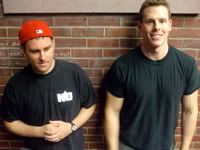
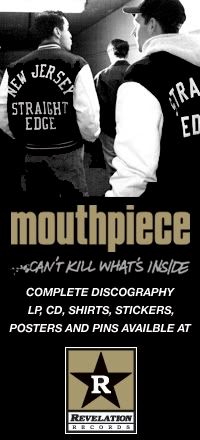
5 comments:
new school represent!
This is an awesome interview. I cannot wait for part 106!
This interview has gone on a bit longer than I expected and Mark Undertow certainly is no Jules Side By Side, but I think it's been an interesting read. If it stays interesting I'll keep reading more parts. Thanks DCXX!
Why would you compare the two (Mark and Jules) at all?
Both interviews have been the most interesting reads on DCXX for me yet, but Mark's interview even more so since I'm more connected to 90's hardcore.
Also great "work" by Ben Edge. The best interviews come through a casual conversation.
Looking forward to more parts. I haven't been this interested in any interview for a long time.
Also, funny that In Honor Of Myself is the only song I like on Get In.
Post a Comment